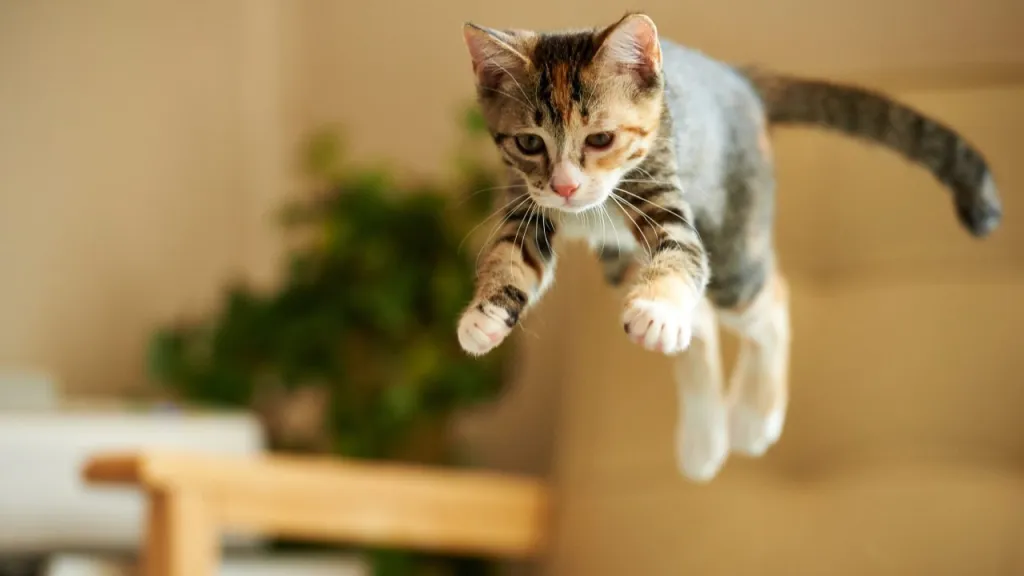Cats have a knack for exhibiting quirky and playful behavior. One of the most common—yet puzzling—actions they display is pouncing on their owners. While this behavior may catch you off guard, understanding the reasons behind it can help foster a better relationship with your feline friend. We’re going to delve into the question, “Why does my cat pounce on me?” and explore effective strategies to redirect this behavior. By gaining insight into your cat’s instincts and implementing appropriate training methods, you can build a harmonious, enjoyable, and safe bond with your fur baby.
Why kittens and cats choose to pounce
Natural hunting instincts
Cats are natural hunters, and pouncing is an instinctive behavior linked to their predatory nature. When your cat pounces on you, it could be a manifestation of their hunting instincts triggered by movement or shadows. They simply view you as their prey and respond accordingly.
Playful behavior
Pouncing is often a playful behavior for cats. It can be their way of seeking interaction and entertainment. Kittens especially exhibit pouncing behavior as part of their development and socialization process. In the absence of another feline friend, pouncing on you may be an invitation to engage in interactive play sessions.
Attention-seeking
Cats are highly intelligent creatures. Your cat may have learned that pouncing elicits a response from you—be it a verbal response, petting, or playing. Your reaction “rewards” the behavior, so they repeat it.
Agitation
According to Vet Street, pouncing may be a maladaptive form of discharging agitation toward people or other animals. An agitated cat “may redirect its aggressive behavior toward the nearest living thing, which in a household is often her owner,” Dr. Wailani Sung writes. “Certain cats also may be bothered by an owner’s quick movements through the house. When the owner is still, the cat appears calm, but when the owner is moving around, whether cleaning or making dinner, the cat may become agitated and pounce.” The next time your cat pounces, be sure to take note what you are doing in that moment.
How to stop your cat from pouncing on you
Redirect the behavior
When your cat pounces on you, redirect their attention to appropriate toys or interactive play sessions. Keep a selection of toys that encourage active play, such as wand toys, feather teasers, or puzzles. Engage your cat in playtime sessions regularly to provide an outlet for their energy and hunting instincts.
Set boundaries
Teach your cat that pouncing on you is not acceptable behavior. When they pounce, calmly and gently say “no” and withdraw your attention. Redirect them to a more appropriate activity, such as scratching posts or toys. Consistency and positive reinforcement for desirable behavior will help establish boundaries.
Provide enrichment
Create an enriching environment for your cat to prevent boredom and excessive energy. Offer interactive toys, puzzle feeders, and vertical spaces like cat trees to provide mental and physical stimulation. This will help channel their pouncing behavior into appropriate outlets.
Playtime before rest
Engage in interactive play sessions with your cat before scheduled rest periods. This will help tire them out and satisfy their hunting instincts, reducing the likelihood of pouncing on you while you’re trying to relax or sleep.
Reward desired behavior
Positive reinforcement is key to training cats. Whenever your cat displays appropriate behavior, such as using toys or engaging in calm play, reward them with praise, treats, or affection. This will reinforce their understanding of acceptable behavior and motivate them to continue engaging in positive interactions.
When pouncing gets out of control
If your cat’s pouncing has caused you injuries, damaged property, or is simply making your relationship tense, it might be time to call in the professionals. Talk to your veterinarian about the issue and rule out any underlying health issues that might be behind the behavior. If your cat’s health is up to snuff, but the pouncing continues, consult a behaviorist. The bond with your cat is meant to be lifelong, and if you two are going to go the distance, there’s no shame in asking for a little help!









